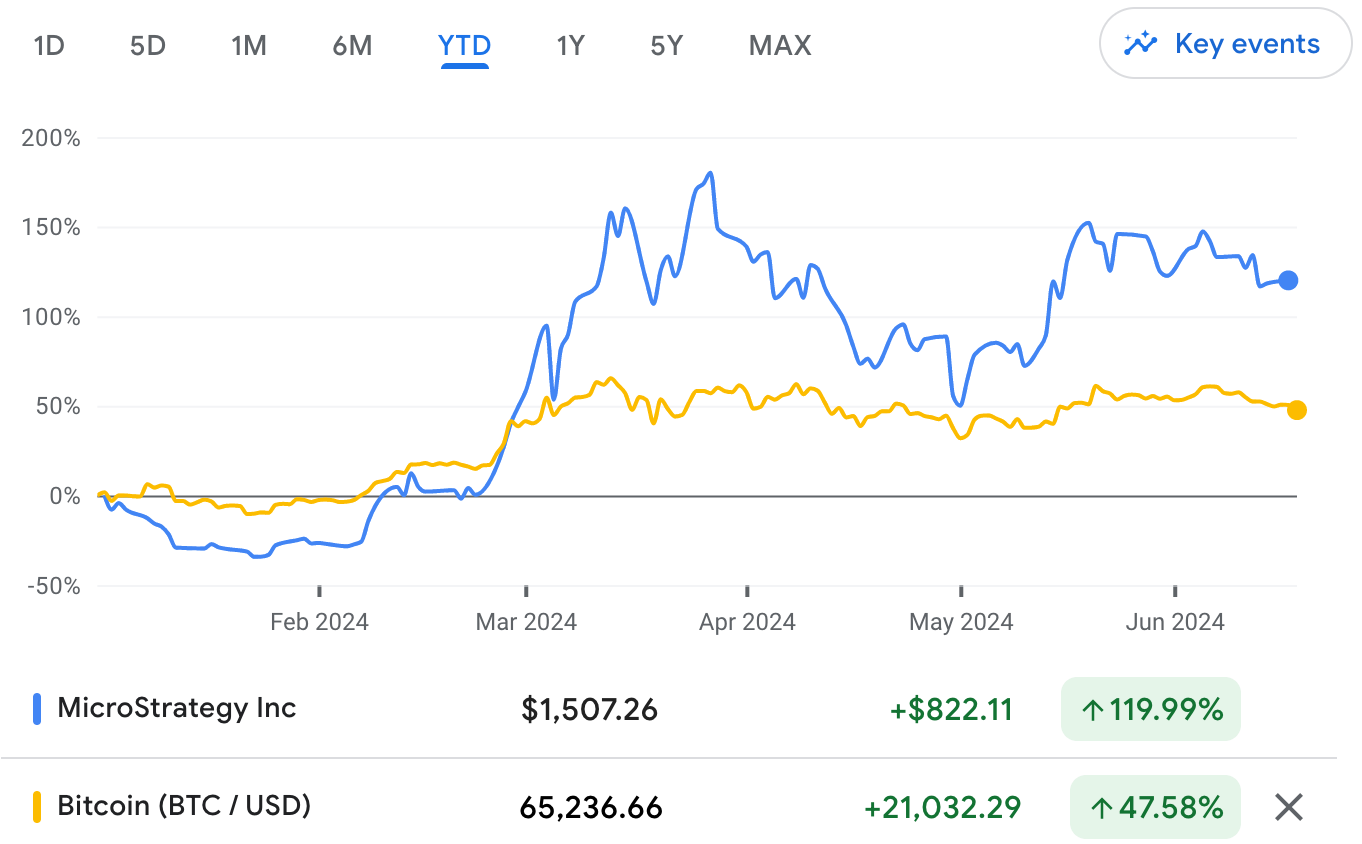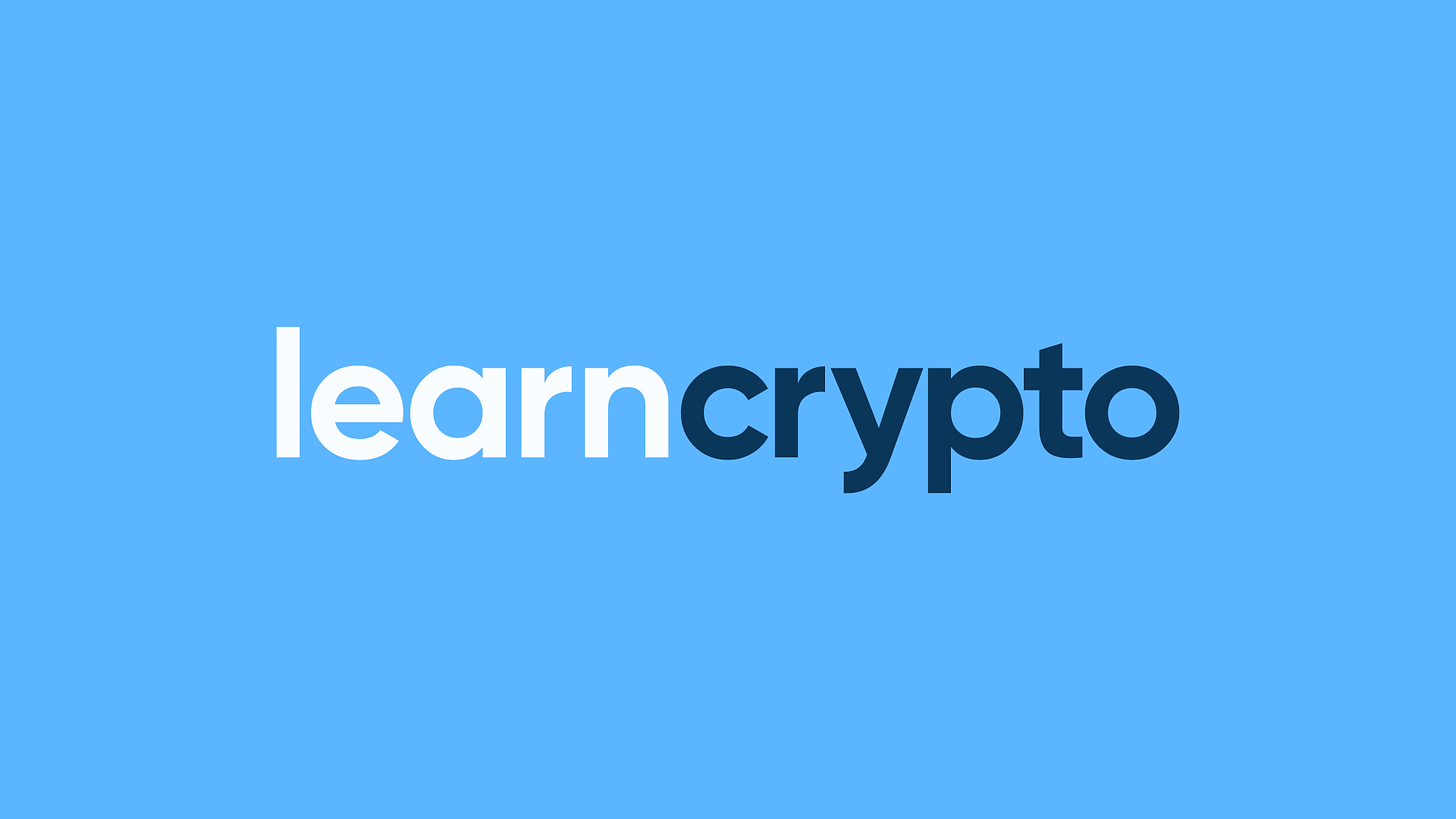Largest corporate holder of Bitcoin boosts loan offering to $700m.
BetDEX CEO talks up the advantages of an on-chain betting exchange.
Terraform Labs to close after agreeing $4.45bn fine with US regulators.
Supreme Court to hear Nvidia crypto appeal.
We going, going, going we ride.
Go big
Super size me: MicroStrategy upped its $500m convertible loan issuance to $700m last week with the proceeds intended to be plowed into Bitcoin. The notes, due in 2032, will be convertible into cash, shares or a combination of both.
Pull the lever: The Michael Saylor-helmed software company turned largest corporate holder of Bitcoin has current holdings worth ~$14.3bn. Analysts from AllianceBernstein last week noted MicroStrategy remains the only firm that is leveraging the capital markets to specifically buy Bitcoin.
Giving an Outperform rating, the team said the long-term convertible debt strategy “allows it enough time to gain from Bitcoin upside, with limited liquidation risk to its Bitcoin on balance sheet.”
Notably, MicroStrategy’s share price has outperformed the price of Bitcoin in the year to date, up nearly 120% vs. Bitcoin’s near 50% increase.
Targets: The AllianceBernstein team also suggested current activity around Bitcoin ETF inflows was “setting the foundation” for a further breakout phase in the cryptocurrency’s price. Their forecast is for Bitcoin to hit $150k by the end of 2025.
🔥 MicroStrategy has outperformed Bitcoin YTD
Crypto education and media customized for you.
Bite-sized learning you can apply straight away in real life. Learn the fundamentals and master crypto while processing through LearnCrypto’s learning program, gain practical skills and explore content that is relevant to you.
Navigate crypto with confidence.
Loose change
Help wanted: The SEC’s top crypto enforcer has quit the agency. David Hirsch, former chief of the SEC Crypto Assets and Cyber Unit, is departing after leading the team for nine years. Hirsch was a major part of significant enforcement actions against cryptocurrency exchanges and decentralized finance projects.
He had previously referenced the heavy workload and backlog of cases faced by the agency, noting it often had to pick and choose targets carefully due to resourcing issues.
Back it up and dump it: Uphold is the latest exchange to de-list multiple stablecoins ahead of the entry into force of the European Union’s new Markets in Crypto-Assets Regulation (MiCA). Other exchanges including Binance, Kraken and OKX have done similar.
MiCA is a landmark regulatory framework for crypto-assets in the European Economic Area, which is set to take effect on June 30, 2024.
Uphold will end support for Tether, Dai, Frax, Gemini Dollar, Pax Dollar and TrueUSD starting July 1.
The regulation requires stablecoin issuers operating within the EEA to obtain licenses as Electronic Money Institutions or credit institutions.
Paradigm: The investment firm led by ex-Sequoia Capital partner Matt Huang has announced its third fund, having raised $850m to be deployed on early-stage crypto-based projects. Previous Paradigm investments include Uniswap, Optimism and Flashbots.
What we’re reading
The crypto vote: “Crypto billionaires and their allies have amassed a $160m war chest to protect their fortunes by bolstering US candidates who favor light-touch regulation of the embattled industry.” In Bloomberg.
Annals of crypto gambling
BetDEX
Baby steps: The world’s first decentralized blockchain-based betting exchange is starting to build up liquidity and has developed a custodial wallet system that means clients don’t need to either hold Solana, pay the associated gas fees or even own their own crypto wallet.
Speaking to The Token Word, CEO of BetDEX Varun Sudhakar noted that normally any completed transaction on the Solana chain would entail a gas fee.
“It’s a big hurdle to ask customers to go and buy Solana and pay this fee,” he said.
Monaco or bust: The premise of BetDEX is that it is the first open source betting exchange allowing for an unparalleled degree of transparency. The company calls this the ‘Monaco Protocol’, a permissionless on-chain matching algorithm and order book system.
“Anyone can access it and build applications to plug in and put liquidity onto it,” Sudhakar said.
Plug and play: It means larger players in the exchange ecosystem, including syndicates and professional sports trading outfits, can plug straight into the backend without needing to engage with the BetDEX front end.
“It’s like the Betfair API, but with two key differences: first, we can’t kick you off the platform for winning and neither do we end up charging more for access.”
“Second, you can be confident that no one is front running order matching,” he added. “It is a very trustworthy environment.”
“You don't have to trust us to be a good actor. You can trust the code.”
Show some love: The regular betting exchange market is still one that is dominated by Betfair, owned by Flutter Entertainment, albeit with strong competition coming from challenger brands Matchbook and Smarkets.
“Flutter’s mind is elsewhere,” noted Sudhakar of the parent of US OSB market leader FanDuel. “I think the opportunity is there to acquire those neglected customers.”
Upping the stakes
The jobs market: Largely crypto-based iCasino and sports-betting operator Stake is reported to be attempting to lure new hires in is native Australia with A$100k ($67k) sign-on bonuses, according to The Sydney Morning Herald.
The paper suggested the Melbourne-based company is growing at such a rate that it is struggling to fill its long list of open positions.
Canada claim: Meanwhile, Earnings+More reported this week that analysts at EKG believe Stake is the leader in the Canadian gray market with around 20% share of a market worth ~C$4bn ($2.9bn).
Terraform penalty
Night, Terra: Terraform Labs is to close after agreeing a $4.45bn penalty with US regulators to settle fraud charges, after a jury found the crypto asset firm guilty of ripping off investors. Founder Do Kwon was also held liable for lying to victims about false use of the Terraform blockchain to settle transactions and about the stability of their crypto asset security, UST.
“Special thanks to the lunatics who supported us through this process and thanks to the TFL team,” said Terraform CEO Chris Amani, in confirming the business will be liquidated.
First domino to fall: In May 2022, UST de-pegged from the US dollar, while Terraform’s other tokens sank to zero, wiping out $40bn in market value overnight and contributing to the collapse of hedge fund Three Arrows Capital, crypto lenders Voyager Digital, BlockFi and Genesis, with the contagion reaching FTX.
At the time, UST was one of the most popular stablecoins in circulation and the blockchain lab was flying high on the back of significant venture capital windfalls.
The unraveling of the scheme “caused devastating losses to countless investors, including numerous retail investors who believed defendants’ lies and poured their life savings into Terraform’s ecosystem,” prosecutors said.
Computer says no: Stablecoins are ostensibly backed with a mix of cash and other assets to match the value of the tokens. UST, however, was backed with code, which crashed.
The US Securities and Exchange Commission (SEC) chair Gary Gensler said the case was another to add to the crypto pile where hype and spin were used to deceive retail investors.
“Terraform and Kwon fought our efforts to investigate – taking a fight over investigative subpoenas all the way to the Supreme Court,” he said. “Thankfully, with this settlement, the victims of their massive fraud will now get some justice.”
Gurbir Grewal, director of the SEC’s Division of Enforcement, added that “despite the vast resources crypto asset defendants deploy” against the agency, justice had prevailed.
“Do Kwon and Terra orchestrated one of the largest securities frauds in US history by, among other things, falsely claiming they had achieved the Holy Grail of crypto: a non-illicit use case,” Grewal said. “As the jury found, that was a lie, as was their claim of creating an ‘algorithmic stablecoin’.”
You can’t conceal it: The troubles are far from over for the Terraform main players, as South Korean prosecutors believe they have more evidence of wrongdoing from Kwon.
The Seoul Southern District Prosecutors’ Office has uncovered a May 2019 chat between Kwon and Chai Corporation founder Shin Hyun-Sung discussing the Chai payment app, which Terraform used to process millions of transactions for Korean consumers.
Kwon allegedly told Shin he could “create fake transactions that look real,” with the app able to dilute the number of fake transactions as it grew, making them “indistinguishable.”
Shin allegedly agreed to the scheme, suggesting they should “test it on a small scale and see what happens.”
Nvidia’s SCOTUS date
When the chips are down: Chipmaker Nvidia has been granted a hearing by the US Supreme Court in a securities fraud class action suit that accuses the world's most valuable company of lying about how much of its revenue came from crypto mining.
The lawsuit was filed following the 2018 collapse in crypto prices, with investors claiming Nvidia tried to downplay the amount of cash it made during the bull run leading up to the market chaos and how reliant it was on crypto sales.
Nvidia is alleged to have pinned the increase in its flagship graphics processing units on gaming demand and understated its sales to crypto miners by some $1bn.
Plaintiffs said the star chipmaker had misled investors and analysts.
In 2022, the firm paid $5.5m to settle allegations by the SEC of not properly disclosing how much of an impact crypto-mining had on its revenue growth.
Events calendar
Jun 19-20: Nordic Blockchain Conference 2024, Copenhagen
Jul 25-27: Bitcoin 2024, Nashville
Aug 13-14: Blockchain Futurist Conference, Toronto
Sep 11-13: Permissionless II, Austin
Sep 25-26: European Blockchain Convention, Barcelona
An +More Media publication.
For sponsorship inquiries email scott@andmore.media.










